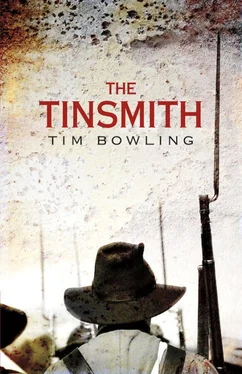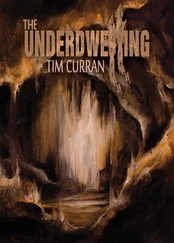In a moment the faces took on definition. All were upraised, open-mouthed. They belonged to yellow men, Chinese, judging by the long pigtails dangling from their dark canvas slouch hats. Briefly, and for the first time, Anson had encountered the race and its language in San Francisco, but this shock meeting on the Fraser River transcended race and speech.
The skiff sped toward him. The faces, young and old, gap-toothed and darkly shadowed, loomed so close that Anson could attach the flung gutturals to individual mouths. The man hunched over in the centre of the skiff held a long pole and swung it toward the wharf. He shouted continuously, his lips peeled back, his hat fallen to the back of his skull and staying there by means of a string around his throat. Each time he swung the pole, the hat jumped up, as if he had a small monkey clutched to his back.
Anson suddenly understood the reason for the terror. The tide was running so fast, and the skiff was just far enough out in the main current, that the man with the pole could not secure a landing. The end of the pole bounced futilely on the first planks of the wharf, each contact threatening to upset the man’s balance and plunge him into the river. Two of the other men grasped the pole man’s coat tails, flailing instructions with their free hands, shouting words as harsh as retches. Another man had scrambled into the stern, where he held his arms out to the east, as if to embrace the sun he didn’t expect to see again. His movements only increased the terror. Two others leapt to their feet and stepped, bent over, toward the bankside of the skiff.
Afraid they planned to jump, Anson shouted, “No! Don’t!” and waved his arms frantically, at the same time looking around for a spot where he could plant his feet. To grab the pole would not be difficult, but how could he keep himself from being yanked into the river? The pole hit the wharf a few feet above him and he squatted, ready to drop backwards, his boots braced against the slightly raised crossbeam at the wharf’s edge.
The Chinese had seen him now. A few words of English exploded out of the strange consonants and vowels, the surprising clarity and force of them almost as great as that of the skiff when Anson finally seized the pole.
“You hold! Swing the bow around!”
A few seconds of slack followed as the pole swung in front of Anson like a scythe. He drew in a deep breath, tightened the muscles in his thighs. In the skiff, the men who had been holding the coat tails now wrapped their arms around the pole man’s lower body. He, in turn, crouched even lower.
With a jolt, Anson jerked forward, his arms tearing at their sockets. But his boots held firm to the raised beam. Second by second, the pole slid through his hands. He felt a stab of pain in his wrists, felt the skin of his palms tear. He lowered his head and hoped his muscles would not snap like weak rope.
The bow turned. A thump sounded on the wharf. Anson looked up to see one of the Chinese scrambling onto the dock and reaching out his hands to the others to pull the skiff safely in. The tension in the pole decreased. Another pair of boots struck the planks. The strange words were still loud but no longer panicked. The tension decreased again. Anson’s shoulders and chest straightened. He drew several deep breaths. The familiar, enticing smell of opium engulfed him. He stared into his hands. Splinters were driven into the bloodied palms.
English again reached his ears. The Chinese surrounded him and grinned so widely that their faces threatened to crack like vases. One man said, “Thank you. You saved us. Thank you, sir.” Another man bowed, then reached out and shook Anson’s hand in both of his. He did not appear troubled by the blood, but Anson grimaced at the contact.
Heavy boot steps pounded across the wharf. Anson looked behind him to see Henry Lansdowne approaching, his face as sad as it had been the night before.
To Anson’s amazement, the thin Englishman barked out a few words in Chinese. All of the men but one cringed at the sound and turned away, busying themselves with the moored skiff. The remaining man’s grin quickly vanished. He was about to speak when Henry Lansdowne held up a hand and silenced him.
“Are you all right, doctor?” he said with genuine concern.
Anson nodded and wiped his bloody palms on his trousers.
“I saw what happened from the window. You’re stronger than you seem. I’m sorry I wasn’t able to get here in time to help.”
“I’m only glad that I was here myself.”
“These damned Orientals. I don’t know why they choose to work near water when they’re so afraid of it. Not one of them knows how to swim.”
Henry Lansdowne scowled at the remaining Chinese—Anson recognized him as the one who’d held the pole. Alone of the group, this man did not wear a pigtail, and his face was fuller, healthier; the others had the emaciated, bone-showing, and skin-slack faces of nutritional deficiency so familiar to Anson from his war years.
“Why would you get it into your heads to travel on such a tide? You should have all been drowned or washed out to sea. Were you trying to get home to China? That’s no way to do it.”
The lone Chinese almost jumped in his eagerness to explain. “Not our fault. He’s crazy. He’s gone crazy. Not like other white men. He used a gun!”
Lansdowne narrowed his eyes. Briefly, he looked beyond Anson, upriver. It was an almost imperceptible glance, but the silence that followed it could not be mistaken.
“He called us spies!” the Chinese continued. “He says we work for Owen. He’s crazy! He says he will make more cans himself!”
Lansdowne said coldly, “He isn’t crazy. Not about that. He can make the cans, right enough. And better than you can make them too.”
He turned to Anson. “I’m sorry, doctor. You’ll want to return to the house. This is more of my brother’s salmon business. These men make the cans for packing the fish.”
Anson clenched his hands, felt the blood stick.
“Spies?” he said to the remaining Chinese man. “Why would he call you that?” He knew from Henry Lansdowne’s tight-lipped expression, if nothing else, that they were talking about Dare.
The Chinese shrugged. “He’s crazy, that’s all. He thinks everyone out to get him.”
Vivid light flooded over the mountain range. Some sort of marsh bird whistled by. Its flight turned Anson’s gaze upriver.
“Maybe someone is,” he said, watching the Englishman.
But Henry Lansdowne did not take the bait.
“If you please, doctor. My wife will see to your wounds.”
Anson looked at his torn palms. “Thank you. But I wish to go to Crescent Slough this morning. As soon as possible. If it’s a matter of payment…”
The Englishman frowned. “Once my wife has looked after you, and the tide is slack, I’ll take you. We don’t charge guests for our hospitality, doctor.”
Satisfied, though a mite embarrassed by his unintended insult, Anson began to walk away. But a strange impulse, a prickling on his nape, made him stop and turn back. Lansdowne and the lone Chinese stood very close together. The Englishman’s lips were moving. Against the pale sky the two heads were silhouetted as clear as cut glass. Anson began to shake. He wished it was only because his old weakness had returned, borne to him on the sweating terror of the men he’d pulled to safety. Because that weakness was something he knew, and knew he could overcome if he wanted to summon the strength. But there existed a curious kinship between this conversation whose words he couldn’t hear and the Latin he could no longer recite with equanimity. The sensation was curious, more so than if he had heard Virgil’s poetry in the mouth of a Chinese.
Anson noticed the empty skiff. If a soldier in a torn uniform had leapt from it, a dead man on his back, he would not even ask him about his purpose. The purpose didn’t matter, not as much as the consequence. And maybe that didn’t matter either.
Читать дальше












